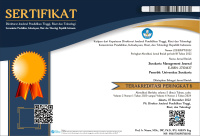Pengukuran Motivasi Berwirausaha Mahasiswa melalui Pembelajaran Bisnis Berbasis Proyek
Abstract
Keywords
Full Text:
PDFReferences
Ajzen. I. (2008). Attitude and attitude Change, Chicago; Psycology Press WD Crano eds
Aziz, Zulkifle, Sarhan (2022) Social Entrepreneurship Readiness amongst the Malaysian Muslim Youths. Journal of System and Management Sciences Vol 12 (2022) No 5 pp 549-567
Battilana J, Leca B, Boxenbaum. (2021). How actors change institution: towards a Theory of institutional entrepreneurship. The Academy of Management Annals 3(1) : 65-107
Beegley T, Boyd D. (2017). Psychological characteristics Associated with Perfomance in entrepreneurial firms and small business. Journal of Business Venturing 2(1): 79-93
Casson, M. (2020). The entrepreneur: An Economic Theory.2nd edition Cheltenham,U.K.: Edward Elgar
Harun, R. (2018). Enterpreurial intention among the student Of University Sains Malaysia. International Journal Of Management and Enterpreneurship Vol 1 (2): 8-20
Hidayat, Y. (2022). Tetap naik kendati orang marah. Kolom Ekonomi Sinyal Pasar. Mingguan Tempo, 6 November 2022
Howard, Z., Senova, M., & Melles, G. (2018) Exploring the role of Mindset in Design Thinking: Implications for capability Development and Practice. Journal of Design , Business & Society, 1(2), 183-202
Juniariani, N., Priliandani, M. (2019). TPB pada Minat wirausaha Dengan Pengetahuan sebagai Moderasi. Jurnal Riset Akuntansi, Vol 9 (1)
Kasali R. (2018). Cracking entrepreneurs inilah para Crackers lokal yang tak ada matinya. Jakarta: Gramedia
Machmud A.( 2020). Characteristics of Islamic entrepreneurship and the business succes of SMEs in Indonesia. Journal of Entrepreneurship Education Vol 23 (2): 1-16
Nugrahani, C., Murjito, H. (2018).Pengembangan Inkubator Wirausaha Inovasi di Perguruan Tinggi. Semnas 2018: Publikasi Hasil Penelitian dan pengabdian Masyarakat. Univet Sukoharjo
Nugroho A.J., Haris,A., Nursito, S. (2016). Model Budaya Wirausaha Berbasis nilai-nilai Kewirausahaan Islami,. Seminar Nasional IENACO-2016 Surakarta: FTI UMS
Nugroho A.J.Setiawati, E.E.D., Santoso, G,B. (2020). Is social Entrepreneurship Learning for Students based on Spiritual Experiences Still relevant? Journal of Education and Practice, Vol 11 (11)
Wijaya T. (2018). Kajian model perilaku berwirausaha UKM DIY dan Jawa Tengah. Jurnal Manajemen dan Kewirausahaan Vol 10 (2): 93-104
DOI: http://dx.doi.org/10.52429/smj.v5i2.1180
Refbacks
- There are currently no refbacks.

This work is licensed under a Creative Commons Attribution-NonCommercial 4.0 International License.





